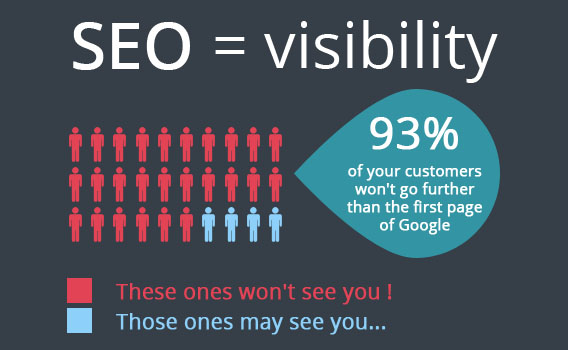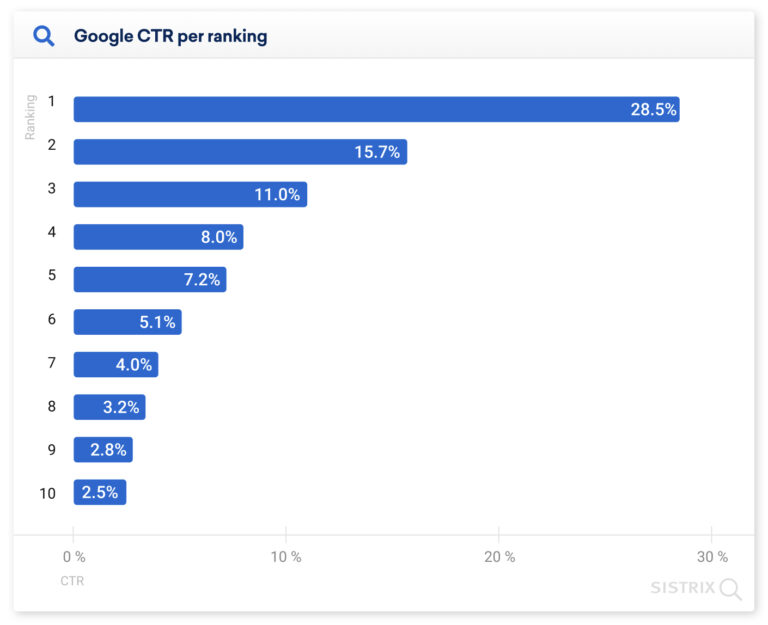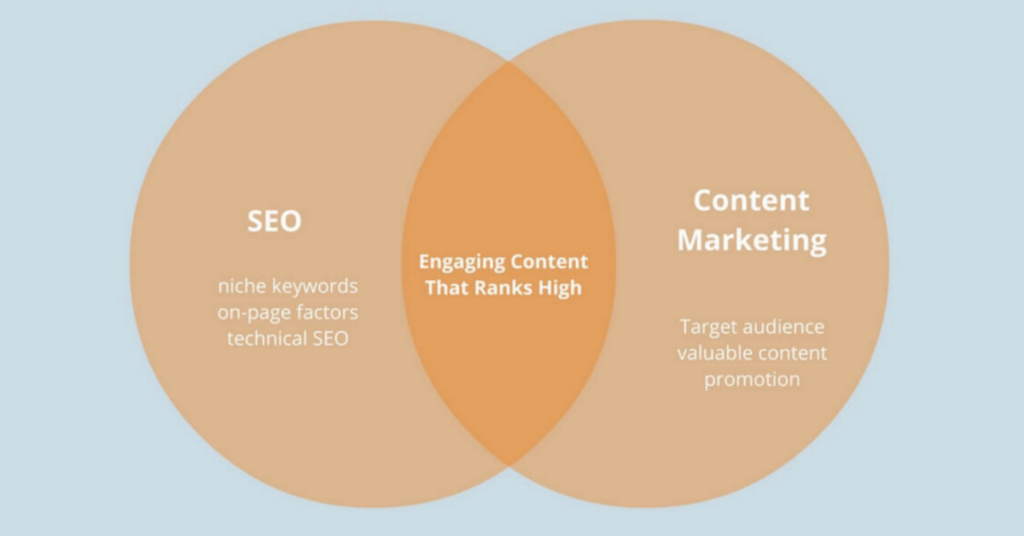
There are around 24 million eCommerce websites across the world. Let that number sink in! This figure alone makes a compelling case for the question: why is SEO important for eCommerce? However, when one digs deeper, the answer is more layered and nuanced than what one perceives at face value. So, to lend clarity to this issue here’s a deep dive into why SEO is important for eCommerce.
9 Solid Reasons Why SEO is Important for eCommerce Websites
eCommerce businesses must focus on SEO as it can yield the following outcomes:
1. Expanding Outreach

Despite what sensationalized rags-to-riches stories want you to believe, your eCommerce business simply cannot turn into an overnight roaring success. If anything, your business may remain anonymous for a long while. And so, your focus should be on stepping out from the cesspit of other eCommerce stores.
Here’s where Ecommerce SEO enters the picture.
Ask any layman what SEO does, and they will tell you the simplest answer that there is – it grants you visibility. eCommerce search engine optimization puts you on the map. Whether you are looking at gaining visibility on the Search Engine Result Pages (SERPs) of popular search engines or waiting to be seen on social media websites – SEO is your podium into the spotlight.
2. Consolidating Brand Presence
In the above section, we have talked about being seen. But there is no point in getting out of sight and going out of mind! You have to also be memorable.
Here again, SEO will play a mission-critical role in propelling your eCommerce store in this direction.
SEO doesn’t just put you in the public eye as a one-off, lucky shot, but it does so consistently. This recurring pattern of showing up in your customers’ organic searches or feeds will help your branding efforts by forming deeper visual and emotional connections with your prospects and customers. Seeing as how it takes approximately six touchpoints to gain recognition, it is SEO that can position your eCommerce business as a brand!
3. Boosting Click-Through Rates

Strategic SEO could land you that coveted first spot on the SERP. And do you know what that means? That’s a juicy click-through rate (CTR) of 28.5%!
Even if you are not at the top, pages appearing second and third still manage to rake in a CTR of 15.7% and 11.0% respectively – which is impressive. And that’s a lot of organic traffic coming your way. More importantly, you would be catching hold of relevant traffic – the real-life consumers looking for the exact product and services you have on sale. And as such, you would be converting these clicks into sales. Interestingly, the highly converting links will also compound your ranking – a wonderful thing that we will go over while talking about building authority and credibility.
Discover the best link building companies in 2024!
4. Filling the Marketing Pipeline
Now that it has been established that SEO lures in relevant traffic, what are you going to do with the flood of traffic coming your way? Plug it into your marketing pipeline, of course!
SEO can be a core component of your lead generation activities as SEO will funnel leads that are most likely to convert. In addition to this relevance, it will grant marketers and sales professionals visibility on the likes and dislikes of your target audiences and the strategies that are yielding the best results. For instance, you may notice how the lead magnets across certain social media platforms are getting more traction. This granular profiling of the buyers and their interests, as highlighted by SEO, can aid sales and marketing activities and amplify their impact.
5. Building Authority and Credibility
Since eCommerce websites involve transactions, they must enjoy a modicum of trust to earn their clientele.
Authority and credibility are two primary trust signals that permit or disallow users from engaging with a site. Interestingly, these (and relevance) are also the pillars of SEO. As such, SEO will embellish these qualities and present your business in a good light.
After all, a website with a respectable organic ranking on the SERPs will be viewed positively by users. And once it gains public favor, search engines will see it as an indicator of confidence and continue pushing your website to the top. In short, you will have an echo chamber in your hands that will reinforce your authority and credibility.
In stark contrast, 96% of buyers do not trust ads or paid marketing – so that route may yield fairly underwhelming results.
6. Driving Growth through Content

Content is an integral part of SEO – even when it comes to eCommerce. Content assets can come in handy for gaining trust, educating buyers, attracting organic traffic, generating leads, and engaging audiences. Further, content marketing can help prospects at different stages of the buyer’s journey – from awareness to decision – while tipping the scales in your favor.
Don’t believe us? Take a look at Shopify! This popular eCommerce platform managed to increase its paying customer base by a whopping 55% – all through the power of blogging! Each blog that offered value to the reader helped cement the company as a formidable brand, which trickled down to profitability. Every eCommerce store should take a leaf out of Shopify’s book to capitalize on content creation.
7. Enhancing Buyer Experience
While the above benefits granted by eCommerce SEO will add value to the buyer’s experience in multivariate ways, technical SEO also makes special provisions for improving site-wide performance with a focus on elevating user experience.
As a result, shoppers will be rewarded with powerful and contextual search functionalities throughout the store, logical information architecture, effortless navigation, informative product pages, a fast-loading website, unambiguous CTAs, and a frictionless checkout experience (even without the annoying account creation requests). Webmasters may also add plugins to display inventory in real-time, announce sales, allow price comparison, permit currency conversions, add product tags, etc., to keep the buyers engaged and increase the time spent on the page.
Such elements will all contribute to a rich and rewarding buyer experience, cultivating loyalty and inducing repeat purchases.
8. Remarketing on Missed Opportunities

Even if your leads turn cold and slip through the cracks, you would still gain useful customer information and delicious cookies along the way. Such data could come in handy if you were to run retargeting SEO campaigns to overcome sales objections. It can certainly get your store back in the game by seeing how retargeting can reengage customers, improve brand perception, reduce cart abandonment, and improve conversion rates! And why stop at retargeting lost customers? Retarget your loyal shoppers, and you will be rewarded accordingly!
9. Making Business Growth Sustainable
Sources state that the ROI on eCommerce SEO is about $2.75 for every dollar spent – which is an impressive 275%! On the other hand, paid advertising fetches an ROI of 200%. And while the difference may not seem like a lot, the gap becomes palpable when big numbers get involved. As such, whether you are a cash-strapped startup or a loaded enterprise, SEO would be your best bet for long-term, scalable, and sustainable growth!
Conclusion
With the above benefits, we hope to have answered why SEO is important for eCommerce businesses. That being said, note that optimization is not a one-off initiative but a continuous process that needs to keep up with the changing pace of customer expectations and internet protocols. Hence, rather than handling it all by yourself, consider engaging an experienced SEO agency for organic SEO services while you focus on the core business functionality of making sales for your e-commerce store.
Read here “12 Essential Questions to Ask SEO Agency Before You Hire Them“.


